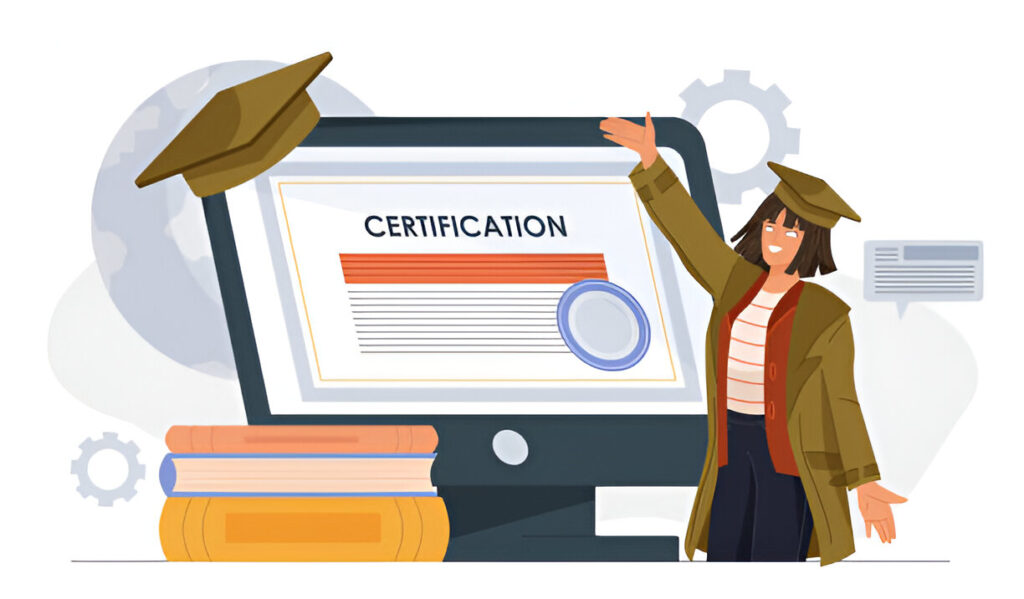In an increasingly interconnected world, the pursuit of global opportunities has become a defining feature of modern life. Whether driven by career ambitions, economic necessities, or the desire for new cultural experiences, millions of people are crossing borders each year. But navigating the complex landscape of immigration isn’t just about packing your bags—it’s about proving your worth in a competitive global talent pool. Enter online certifications: the digital passports that are revolutionizing how individuals enhance their skills, boost their resumes, and unlock doors to international mobility.
In this article, we’ll explore the pivotal role online certifications play in immigration processes, from skill-based visas to long-term residency pathways. We’ll delve into their benefits, real-world applications, and even the potential pitfalls, all while highlighting why they’re more than just a trend—they’re a game-changer for global mobility.
The Rise of Online Certifications: A Digital Revolution in Learning
Gone are the days when formal education meant years spent in brick-and-mortar institutions. Online certifications, offered by platforms like Testizer, Coursera, edX, Udacity, and LinkedIn Learning, provide specialized training in everything from data analytics and project management to cybersecurity and digital marketing. These programs are typically short-term—ranging from a few weeks to several months—and culminate in a verifiable certificate that attests to your newfound expertise.
What makes them particularly appealing for aspiring immigrants? Flexibility. You can learn from anywhere with an internet connection, at your own pace, often for a fraction of the cost of traditional degrees. For instance, a Google Career Certificate in IT Support might set you back just $49 per month on Coursera, compared to thousands for a university course. This democratizes access to education, especially for those in developing countries where quality higher education is scarce or prohibitively expensive.
But beyond personal growth, these certifications are increasingly recognized as valuable assets in immigration contexts. Countries with points-based immigration systems, such as Canada, Australia, and the United Kingdom, award points for skills, qualifications, and work experience. Online certifications can tip the scales by demonstrating up-to-date, job-relevant skills that align with labor market needs.
Enhancing Employability: The Key to Skill-Based Visas
One of the most direct ways online certifications facilitate immigration is through skill-based visa programs. Take Canada’s Express Entry system, for example. Applicants are scored on factors like education, language proficiency, and work experience. While a full degree is ideal, supplementary certifications can bolster your profile, especially if they address in-demand sectors like technology or healthcare.
Imagine a software engineer from India eyeing Canada’s Federal Skilled Worker Program. By earning certifications in cloud computing (e.g., AWS Certified Cloud Practitioner) or AI (e.g., IBM’s AI Engineering Professional Certificate), they not only gain practical skills but also signal to immigration officers their adaptability to Canada’s tech-driven economy. These credentials can translate into additional points or even job offers from Canadian employers, which often fast-track permanent residency applications.
Similarly, Australia’s Skilled Migration program prioritizes occupations on the Skilled Occupation List (SOL). Online certifications in fields like nursing, engineering, or renewable energy can help applicants meet the skills assessment requirements set by bodies like Engineers Australia or the Australian Nursing and Midwifery Accreditation Council. A project management certification from the Project Management Institute (PMI), available online, could be the differentiator for someone applying under the Global Talent Visa, which targets high-skilled individuals in priority sectors.
Even in the U.S., where the H-1B visa lottery is notoriously competitive, online certifications can strengthen petitions by showcasing specialized knowledge. Employers sponsoring foreign workers often highlight these credentials to demonstrate the applicant’s unique qualifications, making the case that no suitable U.S. worker is available.
Breaking Barriers: Accessibility and Inclusivity in Global Mobility
Global mobility isn’t just for the elite; online certifications are leveling the playing field. For refugees, displaced persons, or those in remote areas, traditional education might be out of reach due to conflict, geography, or financial constraints. Platforms like FutureLearn or Khan Academy offer free or low-cost options, allowing individuals to build portfolios that transcend borders.
Consider the story of Maria, a hypothetical Venezuelan teacher fleeing economic instability. Through online certifications in ESL teaching and educational technology from platforms like British Council or Google for Education, she qualifies for a teaching position in Spain under the EU Blue Card scheme. These certifications not only validate her skills but also provide verifiable evidence during visa interviews, where authenticity is paramount.
Moreover, online certifications foster lifelong learning, a trait highly valued in immigration assessments. In New Zealand’s Skilled Migrant Category, points are awarded for qualifications that demonstrate ongoing professional development. A certification in sustainable business practices from Yale University via Coursera could appeal to New Zealand’s green economy focus, enhancing an applicant’s score.
The inclusivity extends to underrepresented groups. Women in STEM fields, for instance, can leverage certifications to overcome gender biases in hiring and immigration. Programs like Microsoft’s Azure certifications empower female professionals from conservative societies to pursue opportunities in progressive countries, where such skills are in high demand.
Challenges and Considerations: Not All Certifications Are Created Equal
While the advantages are clear, it’s important to approach online certifications with a critical eye. Not every certificate holds the same weight. Immigration authorities scrutinize the issuing institution’s credibility—certifications from renowned universities (e.g., HarvardX on edX) or industry leaders (e.g., Cisco Networking Academy) carry more clout than those from lesser-known providers.
Verification is another hurdle. Digital badges and blockchain-secured certificates, like those from Credly or IBM, help combat fraud, but applicants must ensure their credentials are recognized by the target country’s evaluation bodies, such as World Education Services (WES) in Canada or the National Academic Recognition Information Centre (NARIC) in the UK.
Quality varies too. Some programs are rigorous with assessments and capstone projects, while others are more superficial. As a copywriter, I’ve advised clients to choose certifications aligned with international standards, like ISO-accredited courses, to maximize their immigration impact.
Additionally, while online learning is flexible, it requires self-discipline. Dropping out mid-course won’t help your case—completion rates matter, as do endorsements from employers or peers on platforms like LinkedIn.
The Future Outlook: Certifications as Catalysts for a Borderless World
As remote work blurs geographical boundaries and economies recover from global disruptions like the COVID-19 pandemic, the demand for skilled migrants will only grow. Online certifications are poised to play an even larger role, especially with advancements in AI-driven learning and virtual reality simulations that make training more immersive and effective.
Governments are catching on. Initiatives like the European Union’s Digital Education Action Plan encourage digital skill-building, indirectly supporting immigration pathways for certified individuals. In Asia, countries like Singapore and the UAE are attracting talent through programs that value online credentials in fintech and innovation sectors.
In conclusion, online certifications are more than educational add-ons—they’re strategic tools for unlocking immigration success and enhancing global mobility. By bridging skill gaps, proving employability, and offering accessible pathways to professional growth, they empower individuals to turn aspirations into reality. If you’re contemplating an international move, investing in relevant certifications could be your smartest step yet. After all, in the global talent race, knowledge isn’t just power—it’s your visa to a brighter future.



